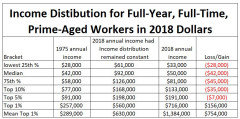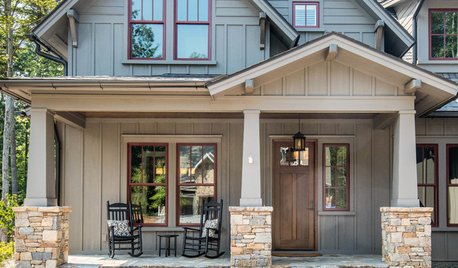Social conditions affecting build design.
When we conceived our build in the good ole days of the late 20 teens, optimism buoyed us up.
But In the nearly five years it took to extract a building permit from the bureaucracy, the world has changed.
Covid, of course.
Then, as a result of lavish "rescue" spending, we faced inflation, tripled mortgage rates (at a 22 year high in Canada). Add in soaring street and retail crime and homelessness. And lately, new foreign wars riling local mobs.
Our world has changed.
Courtesy to Blondie, "our house of glass seemed like the real thing, only to find
mucho mistrust, love's gone behind…"
Now, I'd build an anonymous poured concrete Brute.
Just me?
Comments (58)
worthy
Original Author6 months agolast modified: 6 months agoGM CEO Mary Barra will earn $29 million this year before taxes. Divide that amongst GM's 167,000 employees and bonus them $173.65 each.
Definitely the move to make! ( I bet Mary can't even throw a football, bounce a basketball, or pitch a baseball worth a darn! Let alone sing, dance or do make believe.)
- worthy thanked Anna Devane
Related Professionals
Four Corners Architects & Building Designers · North Bergen Architects & Building Designers · Dardenne Prairie Home Builders · Rossmoor Home Builders · South Farmingdale Home Builders · Claremont General Contractors · Erlanger General Contractors · Euclid General Contractors · Greensburg General Contractors · Milford General Contractors · Nampa General Contractors · Saint Paul General Contractors · San Elizario General Contractors · Sulphur General Contractors · Waianae General Contractorspalimpsest
6 months agoWell in 1980 the top tax bracket was 70% and it's currently 37% percent, and its more likely that the people at the very bottom of the 37% tax bracket (over $570,000-odd income) will be paying much closer to that 37% than Mary Barra will be on her $29M. She has probably got people working on her paying next to nothing, comparatively.
Mark Bischak, Architect
6 months agoMaybe there should be weekly job rotations where each employee will be CEO for a week?
worthy thanked Mark Bischak, Architectworthy
Original Author6 months ago...or popstar, athlete, influencer or movie/TV star of the moment.
Better yet, the Middle Ages where one's status and income in life was dictated by birth rather than the unequal whims of the marketplace.Diana Bier Interiors, LLC
6 months agoI agree that income inequality is a problem, it's getting worse and the data show it.
Playing devil's advocate though, Mary Barra (and other CEOs) are compensated based on the performance of the company, most notably their net income, EPS, and resultant stock price appreciation. If the company doesn't meet expectations, the CEO isn't protected like a union worker, and will be fired. Just read the business press and see how many CEOs are in their positions under 2 years, and then out on their fannies. If the company performs well, they are usually compensated via stock options, which are subject to various tax treatments.
So like athletes and entertainers, there's a risk/reward situation--the higher the risk of losing your job, the higher the potential reward.
That being said, I like Mark's idea of rotating CEOs ;)
Louise Smith
6 months agolast modified: 6 months agoI wonder why people complain about CEOs who run companies that produce goods and services, but I rarely, if ever, hear a complaint about those oversized brutes who throw a ball and run around the grass trying to avoid getting mauled by other oversized brutes who chase them.
These guys make more than the CEOs.
ShadyWillowFarm
6 months agoInequality has been around since we first stood up on 2 feet. It will never go away. The conquerors used to kill you, rape your wife and take all your stuff.
Louise Smith
6 months agoSince we don't all have equal skills, I don't expect everyone to have the same income.
Mark Bischak, Architect
6 months agoSome see successful people and want to be like them, others see successful people and want them to be like them. Opportunity is always there, many people hide from it.
Jennifer Hogan
6 months agoInequality has been around forever, but there are healthy and unhealthy levels of economic disparity. I don't expect that everyone should make the same income, but I do expect that things are healthy.
Slavery was the most extreme level of economic disparity. Do any of you believe it was right? How about the sweatshops when we had children working 15 hour days or the company owned towns run by the mine owners.
What is a reasonable level of economic disparity? Should people be going hungry to support the lavish lifestyles of the rich?
From 1945 to 1975 the rich got richer, but so did the middle class. Everyone shared in the prosperity.
What has happened since then has led to unhealthy levels of income disparity.
 worthy thanked Jennifer Hogan
worthy thanked Jennifer Hoganworthy
Original Author6 months agolast modified: 6 months agoI've got more than $25K of lumber on the ground in front of my build. I can barely sleep at night and take a 2-3 AM run by in my 20 year old Ram to check on whether any Gini levelers are working there. How greedy I am for not sharing a lifetime of scrimping and saving and occasional successes with the "less fortunate".
Jennifer Hogan
6 months ago@worthy "How greedy I am for not sharing a lifetime of scrimping and saving and occasional successes with the "less fortunate".
No one is saying that you should be sharing your wealth, unless you are in the top 1%. Do you earn over half a million a year? If not you have been screwed by the top 1% like the rest of us.
Here is a chart that explains this in dollars rather than a trend line graph. Sorry - could only find a table with 1975 vs 2018 dollars, but the numbers don't get better as we add years and this should be bad enough to make you say WTF.
From 1945 to 1975 income distribution stayed about the same. Some people earned more than others, but the top were earning about 7 times what the middle was earning.
Using 2018 dollars the average middle class person was earning $42k a year.If that same 30 year trend had continued, the middle class person would have been earning $92k a year.
But the trend did not continue. The top started taking more and more and more, so the middle class person only got $50k and the other $42k that they didn't get went to the top 1%.
The average 1 percenter earned $289k in 1975 (using 2018 dollars).If that same 30 year trend had continued, the average 1 percenter would have been earning $630k a year. (not exactly poor).
But the trend did not continue. The top took more and more and more until they were earning $1, 384K a year. $754k more than they would had earned if the trend had continued.
Jennifer Hogan
6 months agoThere is another statistical index that I think describes the demise of the middle class better than most others. The Cost of Thriving Index.
It counts how many weeks it takes to earn enough money to pay for Housing, Food, transportation, education and healthcare for a family of 4.
In 1985, COTI was 39.7. Costs totaled $17,586, while median weekly income for a man aged 25 or older working full-time was $443 ($23,036 per year).
In 2022, COTI was 62.1. Costs totaled $75,732, while median weekly income for a man aged 25 or older working full-time was $1,219 ($63,388 per year).
You only have to work 62 week in a year to support a family of 4.
https://americancompass.org/wp-content/uploads/2023/02/COTI_2023_Final.pdfpalimpsest
6 months agoI've got more than $25K of lumber on the ground in front of my build. I can barely sleep at night and take a 2-3 AM run by in my 20 year old Ram to check on whether any Gini levelers are working there. How greedy I am for not sharing a lifetime of scrimping and saving and occasional successes with the "less fortunate".
- Are you really correlating employed people's income with their willingness to go out and commit felony theft? We are comparing average working people to people at the top here, not criminals to the wealthy--as if criminality does not extend across all economic levels.
If it is simply a matter of thrift, perseverance and not being lazy, why isn't everyone a multi-millionaire? That's the real myth, that anybody in North America who doesn't have a million dollars doesn't have it because they are too lazy to go out and get it, nothing more. By extrapolation, if you are a millionaire, then why aren't you a multimillionaire or a billionaire? You just haven't tried hard enough?worthy
Original Author6 months agoAre you really correlating employed people's income with their willingness to go out and commit felony theft?
Hard work and theft are not exclusive categories. It ain't easy loading up stolen goods in the middle of the night. Or, as I noticed yesterday in the supermarket, slipping a $4.50 pack of mints into your Italian wool overcoat while passing through the checkout. Only now it's excused and rationalized. Leveling up, of course.
Of course, grossly bloated warmongering re-distributive central governments have their favoured classes: subsidized special interests, industries and professions and the supportive chattering classes.
I want my bunker!palimpsest
6 months agolast modified: 6 months agoWealth and theft aren't exclusive categories either. Neither are wealth and paranoia
worthy thanked palimpsestJennifer Hogan
6 months ago@worthy actually has a valid point. One of the risks of having a haves and have nots society is the increase in crime. Robin Hood - take from the rich and give to the poor. Sadly, often it is take from your neighbor and keep for yourself.
When people are scared, desperate or hopeless they do things that they may not do if they were in a more secure position.
I remember years and years ago, back in the 1980s when one of my mother's friends got caught shoplifting. Typical story - supported her husband and his career - got traded in for a younger model and left with kids to raise in a home that had a mortgage that she couldn't afford - went from quite affluent to the working poor in a heartbeat. She told my mom that while walking through the grocery stores she saw the steaks and wanted one so badly, hadn't tasted steak in months and didn't have enough money to buy one. She kept walking around and going back to the steaks and telling herself to leave it alone, but then picked one up and dropped it into her purse. The clerk saw the steak when she was trying to wrestle her wallet out of her purse around the steak. She obviously wasn't a seasoned criminal, but desperation and hopelessness were powerful motivators and she failed to resist temptation.Jennifer Hogan
6 months agoI think the bigger risk is to have a "not my problem" mentality.
First they came for the Communists
And I did not speak out
Because I was not a Communist . . .worthy thanked Jennifer Hoganremodeling1840
6 months agoThou shalt not covet thy neighbor’s house…. There is a reason for this Tenth Commandment. It’s not the neighbor’s wealth that is the problem, rather the damage to one’s own heart. As a former employer, I found not everyone had the same goals. Not everyone cares about food on the table for their children ( time after time, employees who owed back child support would quit without notice when the state caught up with them and wanted money deducted from their paycheck). Not everyone cares if the children in their house do homework, skip school, fight teachers, or damage the neighbors’s house. Not everyone cares if their child goes to college or trade school. I once had an employee who worked for four hours on his first day then went home, never to return. His mother came in for his paycheck and said she needed him at home to run errands for her. I honestly don’t care how much money a CEO makes, nor do I care how much my electrician makes. A workman is worthy of his hire. A person only makes what someone is willing to pay.
worthy thanked remodeling1840bry911
6 months agoThe problem is... Capitalism has a flaw, it is a flaw that we all know about and is similar to the prisoner's dilemma or the game theory problem. Capitalism tends to concentrate wealth and concentrated wealth is bad for capitalism. Basically, there is an incentive for every person to build a bigger house, buy a better car, etc., but the only way for that to happen is to have enough people who are interested in buying that person's stuff and can afford it. As wealth/income gets too centralized there are too few people to buy things.
When functioning well, the economic purpose of government is largely to temper that centralization of wealth, which is why crony capitalism (our current system) is especially problematic. It actually increases the concentration of wealth.
Income disparity is a symptom of the larger problem rather than the problem. It isn't really that CEO's are making too much money, it is that the workers are not making enough money. Moreover, we have been propping up CEO's with public funds for a long time now. For example, workers at retail giants like Walmart and Target are often eligible for various types of financial assistance such as food assistance programs and earned income tax credit. So we are literally subsidizing those costs for the company so the share price can go up while giving shareholders a preferred tax rate. Now we are putting even more protection in place for those businesses by cutting off consumer access to less expensive alternatives in online marketplaces.
----
We should also note, that this isn't a zero sum game. If we give consumers more money they will consume more. It is not like you are going to take money from Jeff Bezos, hand it to John Doe, who will stick the money in his mattress for a rainy day. John Doe is going shopping on Amazon and Jeff will get his money back, only now John will have a better pair of shoes.
Diana Bier Interiors, LLC
6 months agoAnd to Bry911's point, the people who make the laws benefit from crony capitalism as much as the capitalists. So they keep making laws that benefit themselves and the capitalists. This is why the carried interest laws don't get changed. And so it goes....
Jennifer Hogan
6 months ago
Thou shalt not covet thy neighbor’s house….
Agree - but is this about coveting what your neighbor has or is it about standing up against oppression?- Let each of you look not only to his own interests, but also to the interests of others
- Learn to do good; seek justice, correct oppression; bring justice to the fatherless, plead the widow's cause.
- Speak up for those who cannot speak for themselves, for the rights of all who are destitute. Speak up and judge fairly; defend the rights of the poor and needy.
- A new command I give you: Love one another. As I have loved you, so you must love one another.
How did Jesus love us? He loved us enough to die on the cross for us. Most of us are not that good, but that is the commandment. That we are willing to sacrifice for our neighbors.
Jennifer Hogan
6 months ago@ remodeling1840 A workman is worthy of his hire. A person only makes what someone is willing to pay.
It really is a two way street - it isn't just what an employer is willing to pay. Were you paying enough to make it worth working for you?
I owned a small company as well and I could not pay more than minimum wage, but I gave my staff flexible hours, let them bring their kids to work with them, taught them valuable skills and when they were ready I helped them find better jobs. (I had people in the industry calling me when they had openings in their facilities because my employees left me with great skills.) In 25 years I had to fire 2 people for stealing from me and had one quit because he was dissatisfied with me as an employer. I needed him to be able to add a receipt and give appropriate change. I offered to take time each week and tutor him until he learned how to add, but he thought I should pay him for the hours I spent tutoring him. I refused and we were at an impasse. Either he accepted my help or he could walk. He walked. I felt bad. One slipped through my fingers and I couldn't help him.Diana Bier Interiors, LLC
6 months agoThe one comment by bry911 that I really don't understand is
"Now we are putting even more protection in place for those businesses by cutting off consumer access to less expensive alternatives in online marketplaces."
Just curious how the government is doing that?
bry911
6 months agoA too long and too detailed answer...
If you have been seeing a lot of news stories about theft in retail chains that is because the lobbying group for retail chains (the National Retail Federation) has been pushing those stories pretty heavily.
In reality shrinkage (which includes intentional theft, also includes unintentional theft, damaged goods, spoilage, and some vendor errors) is about where it has been for many pre-COVID years, which is between 1.5% and 1.8% of sales. However, inflation and increased sales allow them to make these numbers look higher by using the dollar amount. They are blaming the increased loss on organized retail crime, this is the modern day version of truck hijacking, which in reality is a small part of theft, which itself is only part of shrinkage. So it is no more than a rounding error in reality.
However, the NRF has successfully lobbied Congress to pass or consider several bills to fight organized retail crime.
The INFORM Consumers Act, which recently passed, requires online marketplaces to get information from sellers so stolen goods can be tracked easier. However, some of the things that online marketplaces are required to have and verify are difficult or impossible for overseas sellers to get, which makes it harder for those sellers to sell on eBay, Amazon, Etsy, AliExpress, etc. Overall, it will do little to actually address organized retail crime, but will help large retailers reduce competition.
There is another bill making its way through Congress to stop counterfeiting but they have an incredibly broad definition of counterfeit that largely includes generic alternatives to branded products.
palimpsest
6 months agoIf you have been seeing a lot of news stories about theft in retail chains that is because the lobbying group for retail chains (the National Retail Federation) has been pushing those stories pretty heavily.
In reality shrinkage (which includes intentional theft, also includes unintentional theft, damaged goods, spoilage, and some vendor errors) is about where it has been for many pre-COVID years, which is between 1.5% and 1.8% of sales
I have suspected as much, it's part of the "big bad world" narrative we are exposed to that helps certain associations and lobbying groups whom I will not mention specifically, promote their agendas, and other groups sell certain things.It's much like the promotion of "stranger danger" when, with the exception of some tragic and high profile cases, children are more at risk for physical and sexual abuse, and homicide by members of their own families ( esp. if you want to include mother's boyfriend as well in "family"), than they are at risk from some complete stranger.
And on a local level social media has contributed because one event will be reported from a dozen different perspectives by a dozen different groups or individuals. And even if you realize that it's a single event, hearing about it a dozen times seems to heighten one's awareness so much that it starts to seem like multiple events.
Mark Bischak, Architect
6 months agoSome people build their dream home no matter what their social condition is.

Diana Bier Interiors, LLC
6 months agoOk, I understand your point, bry911 and palimpsest. But when a company like Target, Walmart or the like needs to close a store due to unprofitability because of constant retail theft, then you must agree that it's real. Companies don't choose to close stores because of inflated shrinkage numbers, which are a normal cost of doing business, it's because they are a losing proposition.
palimpsest
6 months agoI don't know for sure but I know someone who worked in the office at a large Target a couple miles from me that allegedly has one of the highest rates of losses and in-store incidents in this city, and that one remains open, while the smaller one closer to me was closed, officially because of the amount of shoplifting, but really it was an underperforming store that had limited stock. So, while it may have partly closed due to theft losses, I think it also closed because of underperformance, so I think it's not just one thing, or why would the Target with the blatant shoplifting and other problems still be open then? And in this climate, why not blame the customer. "Oh we Would have stayed open except you Stole everything, not because you couldn't find what you wanted in the store whenever you came in..."
bry911
6 months agolast modified: 6 months ago“But when a company like Target, Walmart or the like needs to close a store due to unprofitability because of constant retail theft, then you must agree that it's real.”
The short answer, as palimpsest noted, is that store closings because of theft is mostly fabricated. Target, for example, tried adding a lot of smaller neighborhood stores and most of the closings are those stores.
The long story has a bit more nuance, there is a certain amount of theft that is fixed. Suppose a store doing $1 million in sales had $10,000 in fixed theft (1%), drop the sales to $250k and that same $10,000 becomes 4%. The store can then claim that theft was a major factor in the missing profit, but in reality it was just an underperforming store.
Most importantly, how would the various legislation proposals help this problem? The NRF is not pushing for more police presence, investigative resources, tax breaks for loss prevention, etc. They are pushing for legislation to reduce competition from online sellers.
Mark Bischak, Architect
6 months ago"our house of concrete seemed like a fake thing, only to lose
mucho mistrust, love's gone ahead…"Jennifer Hogan
6 months agoI can agree that the same $ value is a larger percentage when the stores fail to perform, but are you saying that all the additional money that stores have spent on security systems, putting items behind grates or glass, was spent because there wasn't a problem that needed to be solved?
Small businesses in California raise the alarmTarget was not the only retailer to raise concerns about retail crime today. Approximately two hundred Oakland business owners closed up shop for a couple hours Tuesday morning and held a demonstration to bring attention to crime plaguing the area.
I have a nephew who worked the gun booth at a sporting goods store. He worked there for years and years, but he said he had to leave. He didn't feel safe anymore. It was no longer where one guy came in and pocketed some fishing lures, it was 8 to 10 guys coming in and emptying shelves. They were instructed by management to turn a blind eye because they didn't want the employees getting hurt. He was worried what they may do to him if they decided they wanted the guns that are all under lock and key and he is the person who can open the cases.
There is also historical evidence that retail theft and organized crime increase when we have recessions, when inflation rises, when income disparity grows. Why would we not see them rise in this economy?
Think of the 1930s, depression era. Did we see a rise in organized crime? Did we have gangsters?
Lower income areas are loosing all the major stores. Target, Walmart, CVS, Rite Aid, Walgreens. The people can't support the stores because they have no money. It is far more likely for those who cannot make ends meet to join gangs and participate in organized crime.Jennifer Hogan
6 months agoI am not sure what the issue is with the inform act. I have read the requirements and I am not disturbed by them.
It only impacts sellers whoIn any continuous 12-month period during the past 24 months, has had 200 or more separate sales or transactions of new or unused consumer products, and $5,000 or more in gross revenues. The only sales that count are ones made though that online marketplace and for which payment was processed by the online marketplace, either directly or through its payment processor.
The online marketplace has to collect- Bank account information. The online marketplace must collect your bank account number, or, if you don’t have a bank account, the name of the payee for payments the online marketplace issues to you. The online marketplace may have you provide that information either directly to it or to a payment processor or other third party designated by the online marketplace.
- Tax ID information. The online marketplace must collect your business tax identification number – or if you don’t have one, a taxpayer identification number.
- Contact information. If you sell in the online marketplace as an individual, the online marketplace must get your name and a working email address and phone number. For legal entities, corporations, partnerships, etc., that are high-volume third party sellers, the online marketplace must collect a working email address and phone number and one of the following forms of ID: a copy of a valid government-issued identification for an individual acting on behalf of the seller or a copy of a valid government-issued record or tax document that includes the business name and physical address of the seller.
In my mind these are not overly restrictive requirements. It is a systematic way to gather information that may lead to the sale of stolen goods. You sell 5000 widgets and never bought any said widgets it may be a red flag that you acquired those widgets through theft.
I do think that since we know that the root cause for the increase in crime is economic disparity we should be doing more to correct this and stop using band aid solutions that will not work, but the last thing any politician wants to do is address economic disparity, so we get more band aids.bry911
6 months agolast modified: 6 months agoThe problem with collecting that information is that it is difficult for sellers overseas to get. Almost half the world doesn’t even have a physical address.
For example, when we lived in Abu Dhabi we had no physical address, neither did anyone else, and Abu Dhabi is not a poor emirate (it has higher gdp per capita than the US). Most businesses don’t have a business license.
So foreign sellers are forced to pay intermediaries which increases the prices.
Jennifer Hogan
6 months agoThe Act carves out several exceptions or alternatives to the disclosure requirements. If a seller has a separate physical address for product returns, the online marketplace can disclose that information instead of the seller’s actual business address. If a seller has no business address, or has a combined residential and business address, the online marketplace need only disclose a seller’s residential country or state and advise the consumer to contact the seller through other means provided by the online marketplace. Similarly, if a seller does not have a separate business phone number, the online marketplace need not disclose the seller’s number and can inform the consumer to contact the seller through other means, such as through the online marketplace’s messaging system.
There is nothing in the act that requires a business license.bry911
6 months agoGetting a U.S. tax identification number for foreign businesses outside the US is a fairly long and arduous process. Which, I believe, requires a physical address or a designated agent with one. Most foreign sellers are never getting that, they are going through an intermediary, which will increase prices for them.
just_janni
6 months agoThe income disparity is also a result of the decrease in the social mobility index - this is the thing that says how likely is your income and social status predetermined by your parents (usually your father). You'd think the US would have good mobility as that is part of our exceptionalism - the opportunity to do / be anything you want if you try / work hard enough.
However we're mid pack and well behind other European countries that we definitely consider "socialist".
This disconnect between what we believe and tell ourselves vs the reality is a stressor, and it's heavily weighted against lower income / folks in lower social classes being able to hard work their way out of it. And unless we work on fixing that, we're going to see more and more social unrest.worthy
Original Author11 days agolast modified: 11 days agoThe government liquor monopoly of the Canadian province of Manitoba isn't buying the sad stories of inequality and capitalist lying. It has instituted strictly controlled i.d. entries to most of its outlets, cutting shrinkage by 92%.
A local SDM near us has a regular bi-weekly visitor who comes in with large bags, sweeps in shelf fulls of cosmetics etc and walks on out to polite calls of "Sir. Sir. Sir." Clearly fully justified in our era of social inequality.
Spotted a late model 4bye in our supermarket parking lot the other day. The driver pulled out dozens of pre-owned work tools spread on a tarp and welcomed customers. Totally honest and legitimate, I'm sure.Mark Bischak, Architect
10 days agoThis reminds me of the fable of the home designer, draftsman, general contractor, structural engineer, civil engineer, home owner, concrete subcontractor, carpenters, and building inspector examining the walls of a newly constructed home trying to determine why the stucco was cracking. All failed to see the real cause was much deeper.




















David Cary